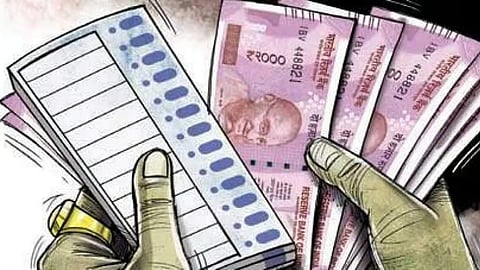

NEW DELHI: The Supreme Court on Friday refused to entertain four Public Interest Litigations (PILs) seeking a court-monitored SIT probe under the supervision of a retired SC judge into the alleged instances of quid pro quo money trail and in award of contracts for huge donations to political parties through electoral bonds.
While refusing to pass any order, a bench of the top court, led by Chief Justice of India (CJI) D Y Chandrachud, said that it could not order for an inquiry into the purchase of electoral bonds on the assumption that it was for quid pro quo.
The CJI, after going through a detailed hearing, rejected the four petitions filed by: Two NGOs -- Common Cause and CPIL, Jai Prakash Sharma, Sudip Tamankar and Dr Khem Singh Bhati. These four PILs sought an SIT probe alleging several indications of donations to political parties through electoral bonds.
The apex court, however, clarified that it was open for petitioners to take appropriate remedial measures under the normal course of law. "If their grievances are not investigated or closure report is filed, then they can approach the High Courts or Supreme Court."
The petitioners claimed that the scheme of anonymous donations through electoral bonds, which was struck down by the SC, has large ramifications on Indian democracy and politics.
While refusing to intervene in the matter, the apex court said, when ordinary criminal law remedies have not been invoked, it could not pass any order into these PILs.
The petitioners sought relief were; court monitored SIT in quid pro quo as disclosed by EB data; a direction to investigate the shell companies; direction to recover amounts from political parties which are found as proceeds of crime; and a direction on the donations done by companies in three years of incorporation.
Lawyer Prashant Bhushan, appearing for the two NGO petitioners termed the electoral bonds scheme as a "scam," wherein the petition sought orders to the authorities for a detailed probe into the source of funding from "shell companies and loss-making companies" that made donations to various political parties.
The petitioners, after relying on the source and data revealed by the Election Commission (EC), alleged before the top court that that they suspect that it might be an arranged exchange of services or favours (in various terms) between the involved parties.
In a landmark judgement, the Supreme Court on February 15 this year, held that the electoral bonds scheme has to be struck down as unconstitutional, and directed banks to stop issuing bonds immediately.
"The Union has been unable to establish the measure adopted in clause 7(4)(1) of the electoral scheme is the least restrictive measure," a five-judge bench of the Top Court, headed by the CJI Chandrachud, said in the order.
The Top Court also in its verdict said that the Amendments to Income Tax Act provision and the Sec 29-C of the Representation of Peoples (RP) Act are declared to be ultra vires.
The CJI also in its verdict said that the Amendment to the Companies Act (allowing blanket corporate political funding) is unconstitutional.
The Apex Court, in its verdict directed the SBI to stop issuing electoral bonds immediately and also should disclose and submit all the details to the Election Commission by March 6.
The EC will make all donations public within one week of the receipt of the information. All electoral bonds within the 15-day validity period shall be returned by political parties to the purchasers, the Top Court said, in its verdict today.
"Lack of privacy of political affiliation would be catastrophic. It can be used to disenfranchise voters. Right to informational privacy extends to financial contributions to political parties," the bench of the Apex Court said.
The apex court had reserved the case on November 2023.
The electoral bonds scheme was challenged, before the top court, by the Association for Democratic Reforms (ADR), Communist Party of India (Marxist), Congress leader Jaya Thakur, and Spandan Biswal and others.